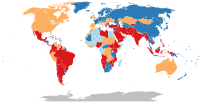
Photo from wikipedia
The purpose of this study was to look at factors that might influence whether or not academics will use e-learning during the Corona Virus Disease 2019 (COVID-19) pandemic. The goal… Click to show full abstract
The purpose of this study was to look at factors that might influence whether or not academics will use e-learning during the Corona Virus Disease 2019 (COVID-19) pandemic. The goal of this paper is to look into the effect of perceived interaction, educational materials, playfulness, perceived enjoyment, self-efficacy, perceived usefulness, and perceived ease of use on students’ attitudes toward and intentions to use e-learning in Saudi Arabia higher education during the COVID-19 pandemic, as well as the indirect impact of student satisfaction with their actual use of e-learning. The research model was evaluated using structural equation modeling (SEM) and route analysis, which were based on e-learning user data collected through a survey. Student happiness and desire to use e-learning both had a beneficial impact on actual use, according to the statistics. During the COVID-19 epidemic, perceived interaction and self-efficacy were shown to be the most important factors influencing perceived usefulness and ease of use, which affected students’ intentions and satisfaction with e-learning. The study’s participants were e-learning users from a government university in Saudi Arabia. Previous studies on e-learning in developing nations have seldom taken a holistic approach. This paper also aims to include a literature review of recent published studies in the field of e-learning usage during the COVID-19 outbreak.
Journal Title: SAGE Open
Year Published: 2022
Link to full text (if available)
Share on Social Media: Sign Up to like & get
recommendations!